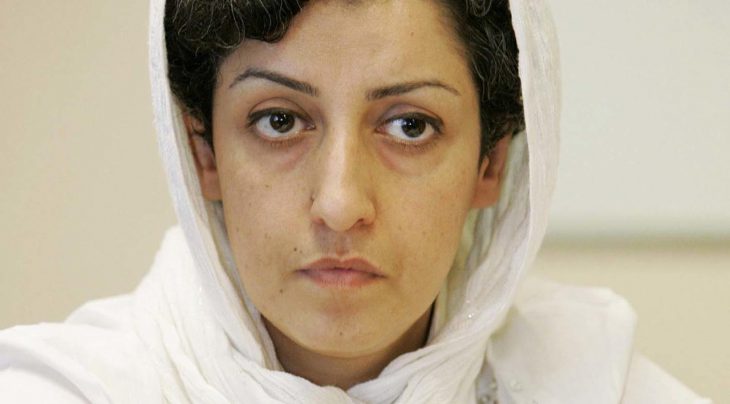In Letter From Evin Prison, Narges Mohammadi Demands Judiciary Stop Violating Due Process Rights

Political prisoner Narges Mohammadi has criticized Iran’s judiciary and security organizations for holding detainees in solitary confinement for prolonged periods without charge while trying to build a case against them.
In an open letter from Evin Prison published on December 12, 2017, Mohammadi discussed the cases of journalists Sasan Aghaei and Yaghma Fashkhami, who have been held in solitary confinement in Evin Prison’s Ward 241 under the control of the judiciary’s intelligence branch since August 2017 without charge.
“Is the judiciary seeking to find documents linking them to terrorism or underground activities? If not, why has their temporary detention been extended after four months?” asked Mohammadi. “If there is evidence against them, why haven’t they been put on trial? The more likely scenario is that there is no evidence and the suspects themselves must ‘confess’ so that evidence can be fabricated against them.”
She continued: “How many times do we have to hear that interrogators threatened to keep suspects in detention until they ‘confessed?’ How many prisoners have to be hospitalized and suffer incurable diseases before someone shows mercy? How many prisoners have to disclose that their convictions were based on forced confessions extracted during solitary confinement before officials and the media discuss this form of torture?”
The deputy editor-in-chief of the reformist Etemad newspaper, Aghaei has been in custody since August 12, 2017. Fashkhami, a reporter for the reformist Roozan newspaper, was arrested nearly two weeks later, on August 21.
The human rights activist and mother of two also asked why Parliament and President Hassan Rouhani have ignored complaints about the ongoing violations of due process and prisoners’ rights by the judiciary and security forces.
“Amid the silence shown by government officials and lawmakers towards solitary confinement, one should ask whether they are aware that the Supreme Administrative Court has declared this form of torture as illegal? Why are they ignoring their duties under the law and to the people who voted for them? Why has there been no response to complaints to the President and the Parliament? Is complaining to international organizations the only option left?”
Mohammadi, who has been behind bars since May 2015 serving a 16-year prison sentence for peacefully advocating for human rights, also wrote an open letter on October 8 to members of Iran’s Parliament calling on them to investigate the “illegal” practice of solitary confinement.
“As a defender of human rights who has been tortured by this practice, I consider it my duty to take every opportunity to express my protest against solitary confinement, the suffering victims of which I continue to see in Evin Prison,” she wrote to lawmakers.
Mohammadi was first arrested in 2009 and sentenced to 11 years in prison for the charges of “assembly and collusion against national security,” “membership in the Defenders of Human Rights Center,” and “propaganda against the state.”
Upon appeal, her sentence was reduced to six years behind bars and she was released from Zanjan Prison in 2013 on medical grounds. However, Mohammadi was arrested again on May 5, 2015, two months after meeting with the European Union’s foreign policy chief at the time, Catherine Ashton, at the Austrian Embassy in Tehran.
In September 2016, the Appeals Court upheld a 16-year prison sentence against Mohammadi for the charges of “membership in the Defenders of Human Rights Center,” “assembly and collusion against national security,” and one year for “propaganda against the state.”
She will be eligible for release after serving 10 years.






